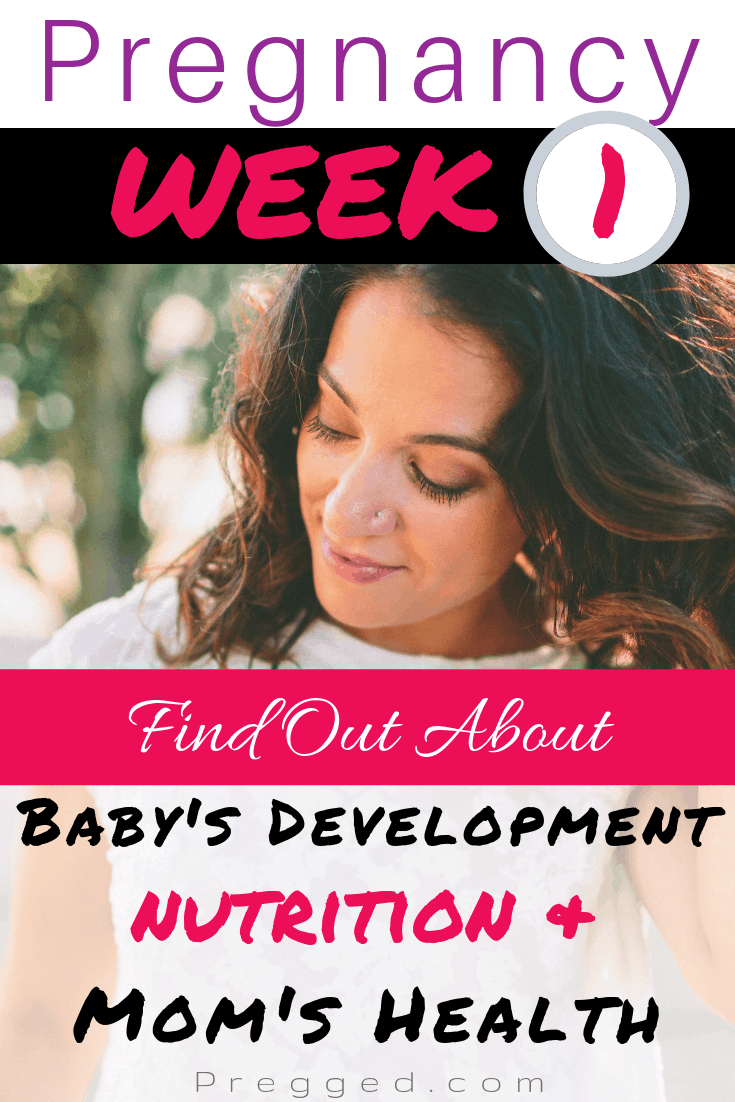
Welcome to our pregnancy week-by-week series! Each week-by-week post is separated into three handy sections.
1. Mom – Section one covers the changes Mom will experience and the things she may need to consider health-wise.
2. Baby – Section two looks at the development of the fetus and what’s going on with baby inside the womb.
3. Nutrition – Section three covers nutrition for each week of pregnancy so that you know what foods are important to include in your diet at each stage.
Pregnancy Week 1 – Mom
Did you ever consider that when you go to the doctor thinking you are 5 or 6 weeks pregnant, you are really 7 or 8 weeks along?
That’s because technically you are not pregnant during week one.
I know, shocking right?
The first week of pregnancy doesn’t start at the time of fertilization of the egg or even with implantation of the fertilized egg.
In fact, the first week is usually when you are bleeding from a normal menstrual flow and not even thinking about pregnancy.
By convention, you are given and extra 2 weeks to take into account the time for ovulation (egg release) which is usually about two weeks from the first day of your last period.
This might sound confusing, but it makes sense to calculate the pregnancy this way because years ago, no one had any way of knowing exactly when an egg was fertilized.
The only dates to go by were the dates of your monthly bleed.
Now with artificial reproductive technologies (test-tube pregnancies), the exact day of fertilization can be known.
Your estimated due date is either 40 weeks from your last menstrual period or 38 weeks from ovulation.
Related: If you’re having symptoms and are wondering if you’re pregnant already check out our post on super early and rare pregnancy symptoms for more clues.
Baby Development Week 1
It’s a wonder that there is a population explosion worldwide, when you consider that the chances of any couple getting pregnant in any given month is about 20%.
Pregnancy starts in the brain and requires four organs to get the egg primed for release to be fertilized.
And that’s only the female side of the story.
First, your brain uses two organs called the pituitary and hypothalamus to release hormones that cause the ovary to make the egg and release it.
And then the Fallopian tube, which is technically part of the uterus, must delicately pick up the egg and hold it safely for the sperm to find it.
In the meantime, hormones from the ovary prepare the uterus for a fertilized egg; who happens to be your little precious human being.
Except, wait!
There is nothing living during the first week of pregnancy.
It’s merely a convention to use the first day of the last period to predict a due date or EDC (Estimated Date of Confinement).
Confinement is an old-fashioned term that literally means the day you are expected to be confined to a bed, although many of us choose not to be confined to a bed during labor nowadays.
So, in week one, there isn’t even an egg or a sperm; nothing except 4 organs doing their thing.
Likewise, the man who makes the sperm needs four functioning organs to do his share of the work.
Fair is fair.
Any sperm hanging out now are not the lucky guys.
You can be getting ready for your impending pregnancy by taking at least 400 micrograms of folic acid or around 1000 mg of natural folate along with a prenatal vitamin every day.
It can help to prevent specific birth defects such as spina bifida, which is a spinal cord problem that can cause paralysis.
You must have this folate in your system ahead of conception to support your baby’s healthy development.
Fortunately, spina bifida is very rare.
Most prenatal vitamins have folate and omega-3s from fish oils – but read the labels carefully and ask your healthcare practitioner for recommendations.
>>You got a negative pregnancy test but still don’t have your period? Find out about it here!<<

Nutrition for Week 1 of Pregnancy
This week certain foods and eating patterns can help you to create the right conditions for conception, and every mom-to-be should know about them.
It’s essential to choose nutrient-dense foods, keep healthy habits, and exercise often to ensure a healthy 40 weeks for you and your baby.
As the first step, avoid dangerous substances including alcohol (even beer and wine), nicotine and non-prescription drugs.
Then, kiss fast food goodbye – French fries, hamburgers, and hot dogs.
When possible, choose baked dishes instead of fried.
Excessive salt, spices, coffee or strong tea are also best avoided during this time.
Low levels of caffeine are generally fine – but say no to the espresso.
Cook meat for at least 40 minutes to ensure there are no harmful bacteria left. And don’t forget your fresh fruits and vegetables! Many vegetables and plant based foods contain naturally occurring folate, as well as a wide range of other essential vitamins and minerals.
As already mentioned, one of the most crucial vitamins to take before and during pregnancy is folic acid or folate. Folate is a B vitamin that significantly reduces the risk of neural-tube defects in your baby.
The best food sources of folate are beans, legumes, citrus fruits, and whole grains. Chicken, pork, and fish are also protein sources of folate.
However, folate from foods may be harder to absorb into your body than folic acid supplements so you need to make sure you’re eating plenty of folate rich foods.
If you have a family history of spina bifida, or you take certain prescription medications which increase the risk of neural-tube defects, your healthcare provider may recommend that you take more than 400 micrograms of folic acid each day.
Sources:
1. https://www.whattoexpect.com/pregnancy/week-by-week/weeks-1-and-2.aspx
2. https://www.healthline.com/health/pregnancy/pregnancy-symptoms-week-1
3. https://www.webmd.com/baby/folic-acid-and-pregnancy#1
